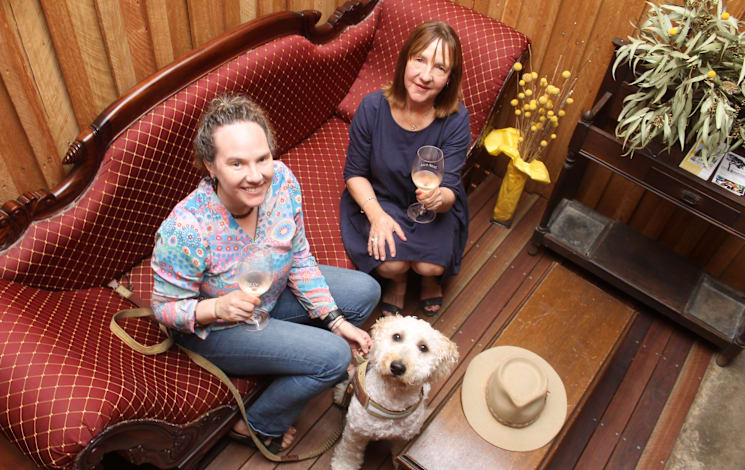By ANDY WILSON
THE Alpine Valley boasts some of the nation's best cooler climate wines and this season will be one closely watched by local growers, if last season is anything to go by.
Continued rain due to La Niña has vineyards at the ready to avoid vine diseases if the wet weather continues into summer.
The region has the distinction of being one of the most elevated growing areas in the country and boasts 15 wineries and 50 growers.
The area had its official 'geographical indication' recognised on October 7, 2000, by the late deputy Prime Minister Tim Fischer when he launched the region with its own motto of 'Altitude with Attitude'.
Latest Stories
The attitude of growers in facing environmental threats matches that toward cooperation between them.
In contrast to the two wet seasons already endured, three major bushfires since 2003 took toll on harvests, with the grapes for those years impacted by smoke tainting.
In 2020, Bush Track Wines lost its entire crop due to smoke.
Winery manager Bob McNamara and his wife Helen said that the lost revenue from bushfire years is a significant financial burden.
"We lost everything in that year," Mr McNamara said.
"That was 12 months of income we don't get, and that's not a lot of fun."
The McNamaras established Bush Track Wines at Whorouly South in 1987 with hand–rammed posts cut from local red box trees which Mr McNamara still replaces by hand.
The couple operate the vineyard in balance with nature to minimise chemical use, and the coincidence of the wet weather causing trees to fall and so supply fresh posts, is not lost on the couple.
"I have been able to shore up a lot of posts that have slumped due to the wet, and thankfully some trees came down for the same reason," Mr McNamara said.
"The only trouble is that they are hard to nail into."
Managing against diseases caused by a wet summer requires specific pruning and trellising practices for which Mr McNamara has extensive expertise.
"The pruning and arching of vines is really dependent on the variety," he said.
Local practice for wet summers is to open the canopy of the vines to avoid high humidty that can cause diseases.
Closer to Myrtleford, Tony and Josie Ferraro were able to salvage their production costs after the 2020 bushfire by selling their crop as a juice concentrate due to smoke taint.
The couple has been growing vines on their mixed business farm where cattle, onion seed, and lucerne share their workload.
They have operated the vineyard entirely on their own and have opened a tasting cellar door in former drying kilns that Mr Ferraro's father used when the property once grew tobacco.
Key to the winery's success has been the Ferrro's ability to grow seven different varieties at any one time and to follow trends in changing tastes.
Mr Ferraro said their flagship wines were Barbera and Nebbiolo, which comes from the Piedmonth region in northern Italy.
"You don't know how long a trend is going to last, and right now Prosecco is the flavour of the month," he said.
"They say that the trick to keeping up with trends is to plant what others are pulling out."
The Ferraro's expertise matches that of the area's other wine makers.
"A wine is made in the paddock and not in the winery," said Mrs Ferraro.
To face this summer's impending wet weather, Mr Ferraro reiterated the importance of vine canopy management.
"You need to know how to make different structures for different circumstances," he said.
"It is also important to know how much fruit to take off when thinning the crop; you try to not to over crop in case you have a wet year.
"Last season a lot of our varieties did not crop right.
"A massive bunch will be out of balance between the leaf and fruit, so you don't want real big bunches."
However, the lynchpin to the region's success is Jo Marsh, a medal–winning graduate of Adelaide's famous Roseworthy Agricultural College School of Oenology, who moved to the area in 2012 to become winemaker at Feathertop Wineries.
Ms Marsh is considered a key player who has helped put the region on the map and for whom high praise comes from growers.
"Jo is a great winemaker," Mr Ferraro said.
"She makes wines that you've never heard of.
"If something sounds interesting, she'll grab it and make it."
"Jo has come a long way, too, so she is improving the area's reputation," Mrs Ferraro said.
The McNamara's are equal in their appreciation of Ms Marsh starting up her own winery that has brought the local industry together, with support from growers such as the McNamaras.
Ms Marsh established Myrtleford's Billy Button Wines in 2014 and supports local growers by making unique wines from their grapes and yet is very modest about her achievements.
"The secret is to foster a mutually beneficial relationship with growers," Ms Marsh said.
"We allow people to do what they do best – let the vineyards stick to growing grapes, and we will focus on making the wine," she said.
Despite China's high tariffs on Australian wine, Ms Marsh said the Alpine Valley region is largely protected from such an impact due to extensive local sales and the large variety of wines on offer.
"There is a lot of demand in the local market, so we are buffered more than other regions in regard to China's action," she said.
Ms Marsh said the diversity in wines is largely attributed to the local range of soil types and microclimates.
"I always recognise the grapes being used on my labels," she said.
"The variety of wines made here helps the region become more widely known."















